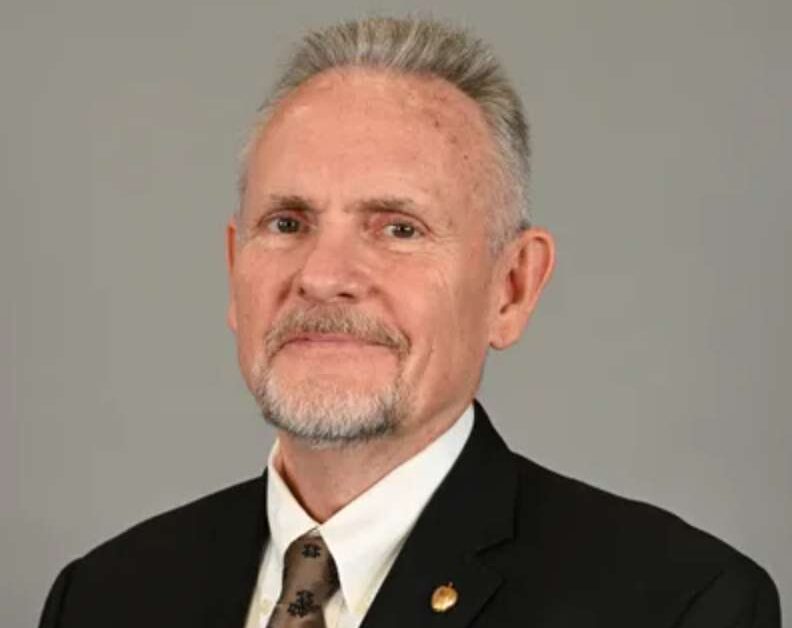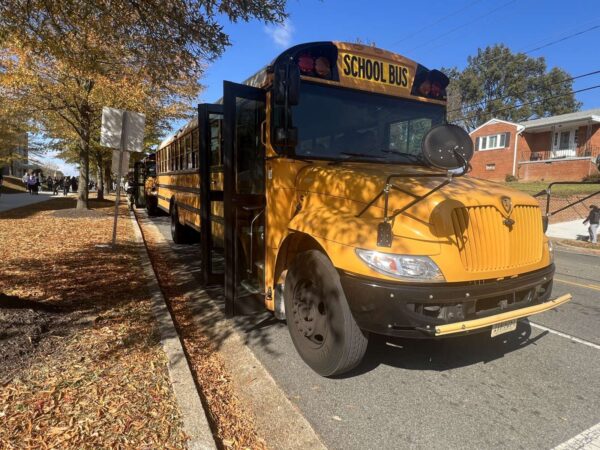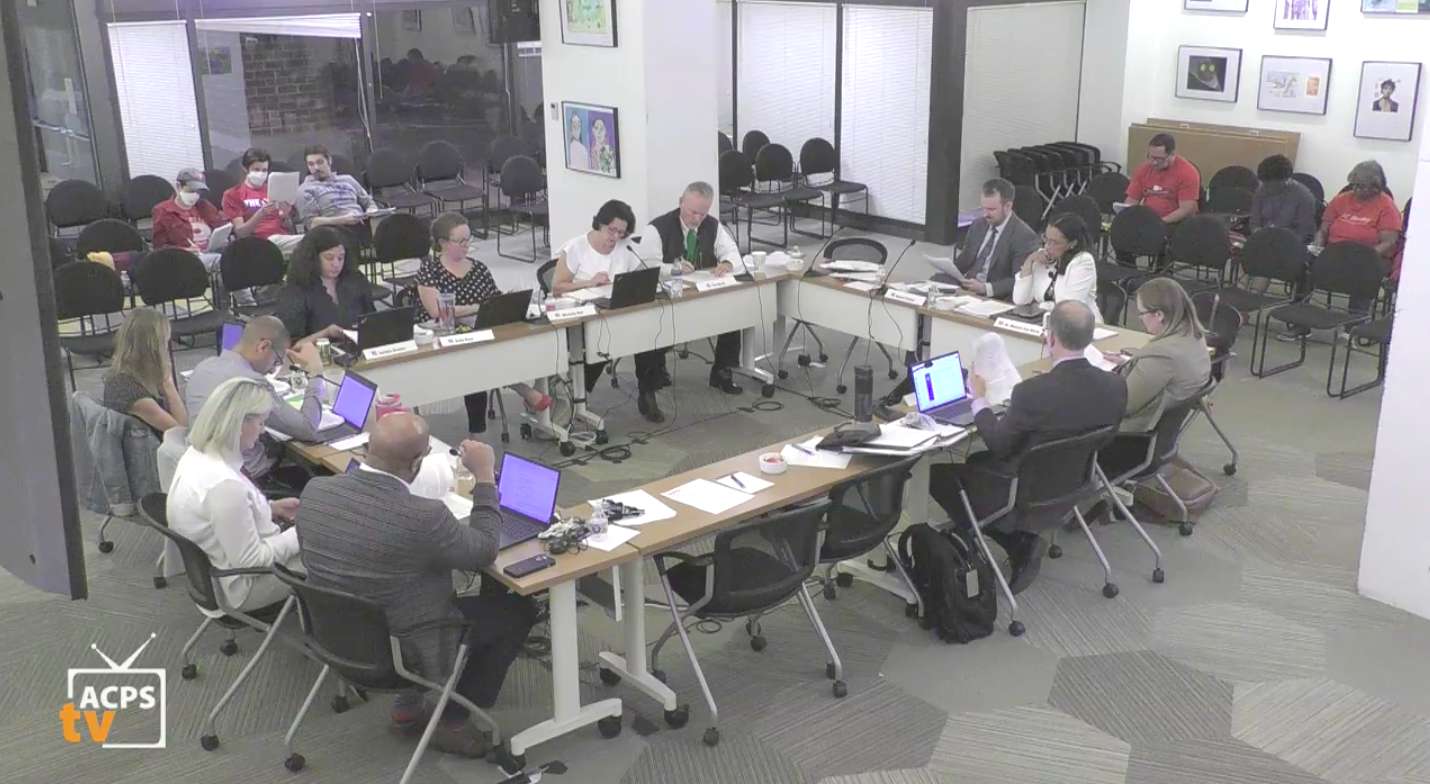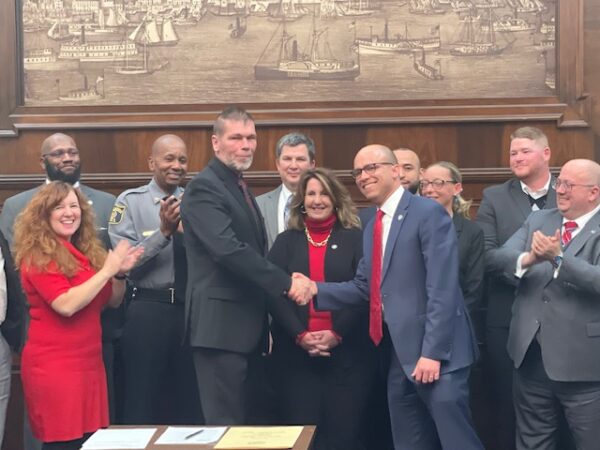
Alexandria School Board Member Tim Beaty just won his special election in January, and now he tells us that he’s running for reelection in November.
Beaty won a special election on Jan. 9 to fill the District A seat vacated by former School Board Member Willie Bailey. He was sworn in days later, and said he would spend the next several months learning the intricacies of Alexandria City Public Schools before deciding on whether to run for reelection on Nov. 5.
“I was just at the Alexandria Democratic Committee meeting asking people to sign my petitions, and more than one person said, ‘Didn’t I just sign this for you?'” Beaty said.
Beaty ran on a platform of helping ACPS navigate the new and complex collective bargaining process with licensed teachers and staff. The school system is currently experiencing a staffing crisis, and Beaty says that a strong collective bargaining agreement will improve retention.
Last month, the School Board unanimously approved a collective bargaining resolution, laying the groundwork for a future agreement. Beaty believes he was an important contributor to the process, and said that now the hard work begins.
“Over the last few months, I have enjoyed my interaction with my colleagues on the School Board and with the senior staff in the division,” Beaty said. “I feel like I made a useful contribution, particularly during the debate about the resolution that enables union recognition and collective bargaining.”
Beaty continued, “I believe that this is a process that is going to benefit us, that’s going to be a process in which our employees feel more engaged, more respected, more listened to, and in the end through this process and leading to a collective bargaining agreement, I think we’re going to have a much better labor management relationship going forward. We need that. We need our employees to feel like they’re being listened to, that they have a voice.”
Beaty retired two years as the global strategies director for the International Brotherhood of Teamsters. He and his wife moved to the city 10 years ago, and until he was elected was a substitute teacher at two ACPS elementary schools.
He also voted with the School Board to ask the City Council for a tax increase to restore steps and fund teacher raises.
“Our staff is working very hard, and they need a raise,” Beaty said. “We live in an area that is expensive to live in — housing and other things. For them to be able to live a good life and be able to focus on doing a good job every day, we need to compensate them well. So, I was happy to move for funds above the superintendent’s proposed budget.”
District A includes Old Town, Del Ray, Potomac Yard and Arlandria. Incidentally, the filing deadline for School Board candidates is June 18, which is the same day as the Democrat and Republican primaries. So far, only one School Board candidate has filed paperwork to run — Alexander Scioscia in District B.

The Alexandria School Board unanimously approved a collective bargaining resolution Thursday night, setting the ground rules for how the school system will negotiate with staff on wages and benefits.
Dawn Lucas, president of the Education Association of Alexandria, was pleased with a number of changes that she recommended the Board make to the proposed resolution.
“I feel like we’re in a good place,” Lucas said. “Our teachers and staff are going to have seats at the table, and their voices will be heard.”
School Board Chair Michelle Rief said that Alexandria City Public Schools wants to come to a collective bargaining agreement by the end of 2024.
“I think it’s a milestone moment for our school division,” Rief said. ” I want to thank the Education Association of Alexandria, our ACPS staff and community members who were engaged in this process. We heard your feedback, we incorporated your feedback and I’m very pleased with where we landed with this final collective bargaining resolution.”
The school system is currently experiencing a staffing crisis. Last October, EAA sent the Board an employee certification on behalf of licensed teachers. That submission gave the Board 120 days to adopt a framework for the resolution.
Among the changes to the draft document was Board Member Abdel Elnoubi’s recommendation to remove a 30% voting threshold for employees to establish two unions for bargaining. Those units can now be chosen with a simple majority of staff.
Elnoubi said that the Board’s work on the resolution was the best experience he’s had throughout his single term.
“I got to roll my sleeves and do work and get involved in the work from the beginning and be part of the process,” Elnoubi said. “I don’t think as board members we get to do that a lot, so that was a really good experience, to feel that we are actually solving problems and working hands-on.”
The Board also increased the number of yet-to-be-determined bargaining topics from four to six, and left the door open for more topics if voted on by the bargaining units. Additionally, after the first agreement expires after three years, collective bargaining to administrative staff.
ACPS middle school teacher David Paladin Fernandez was also pleased with the resolution. Fernandez is running against Lucas for EAA president in a union election this summer.
“I do appreciate the immense amount of work that the Board has done to improve this document from where it was last week when it was first released,” Fernandez said. “The fact that they struck out the voter participation threshold is a tremendous win for not just employees here in ACPS, but for Democracy itself.”

The Alexandria School Board made significant changes to its proposed collective bargaining agreement resolution with staff on Thursday night.
In a work session that ran until nearly midnight, the Board amended the 17-page draft resolution, which sets the rules for negotiations on a three-year agreement. The draft resolution reveals a slow rollout for the Alexandria City Public Schools bargaining process that will only reach full fruition in future negotiations, with the school system currently focusing on reaching an eventual collective bargaining agreement on six yet-to-be-determined topics with a portion of employees.
The document was heavily criticized last month by the Education Association of Alexandria (EAA) union. EAA was adamantly opposed to the draft recommendation that 30% of licensed staff and support personnel vote to create two separate employee unions, or bargaining units, to represent them.
“We got some things and others we did not,” EAA President Dawn Lucas said. “We are not in agreement with any voter thresholds and don’t want limitations on bargaining topics.”
Last October, EAA sent the Board an employee certification on behalf of licensed teachers. That submission gave the Board 120 days to adopt a framework for the collective bargaining resolution, with a full board action expected on Thursday, March 21. ACPS wants to come to a collective bargaining agreement with staff by the end of the year, School Board Chair Michelle Rief said earlier this year.
School Board Member Abdel Elnoubi got majority support from his colleagues to remove the 30% voting threshold for employees to establish unions for bargaining.
“I don’t think anyone in this town was elected with 30% of the vote, not the mayor and City Council, and not us,” Elnoubi said. “I think it’s a burden that’s unnecessary.”
Board Member Chris Harris said he felt challenged by removing the 30% threshold.
“I’m challenged by this,” he said. “I’m just not sure what the engagement looks like. There could be two people. That could be a handful of people make a decision for an entire business unit. I’m not okay with that.”
The draft document now stipulates that employee unions can be established by a simple majority of staff within their respective employee groups.
The Board added Member Ashley Simpson Baird’s recommendation to increase the number of bargaining topics from four to six, and adding a sunset clause removing all restrictions on the number of topics that can be bargained after the first agreement expires.
Also approved was Vice Chair Kelly Carmichael Booz’s proposal to expand collective bargaining to administrative staff after the first agreement expires.
School Board Member Tim Beaty, a former leader with the International Brotherhood of Teamsters, won a recent special election by campaigning on the importance of collective bargaining. He added language that will make the school system pay for the union elections.
“To me, the election is an obligation of the government that’s holding the election,” Beaty said. “We’re not trying to state what the rules are for the election, but we will pay for the election.”
ACPS middle school teacher David Paladin Fernandez is running against Lucas for EAA president. That election is expected to be conducted in May and the results released before July 1.
Fernandez sat through the nearly four hour meeting and walked away hopeful. Changes he’d like to see are management providing mailing lists of staffers to the EAA on a quarterly basis, and adding a “just cause” clause forcing the school system to tell employees why they are being disciplined or fired.
“EAA needs this to pass,” he said. “I like the level of discourse. It’s not something we see often out of the School Board. I’m largely happy.”

There’s a new member of the Alexandria School Board. Tim Beaty, the retired former global strategies director for the International Brotherhood of Teamsters, was sworn into office on Thursday night.
Beaty won a special election on Jan. 9 to fill the seat vacated by former School Board Member Willie Bailey. He will fill the remaining 11 months of Bailey’s term before the next School Board is sworn into office in January 2025. During that time, he said that he wants to help Alexandria City Public Schools edge closer to a collective bargaining agreement with staff.
“I am truly honored to serve on the Alexandria City School Board,” Beaty said in a release. “I look forward to bringing that experience to the division as we move forward with collective bargaining to enhance labor-management relationships between employees and the division.”
Beaty moved to Alexandria a decade ago with his wife, who is a principal at a Fairfax County Elementary School. He retired two years ago, and has been a substitute teacher at two ACPS elementary schools since then.
“We are excited to welcome Mr. Beaty to serve on our School Board,” said School Board Chair Michelle Rief, who also represents District A. “Mr. Beaty has not only contributed directly to ACPS as a substitute teacher but the greater Alexandria community as well, volunteering and serving in various capacities throughout the city.”

Alexandria City Public Schools is in the initial stages of organizing a collective bargaining effort for thousands of its employees.
The school system has more than 2,400 employees and pays $11.6 million in salaries, with funds approved by the City Council. That means that any agreement reached between ACPS staffers and the school system will have to be approved by Council.
“In this case, you’re going to be negotiating a collective bargaining agreement for about 80% of your costs,” Mayor Justin Wilson said at a joint City Council/School Board Subcommittee meeting on Monday (Nov. 28).
Wilson continued, “Without some special structure put together, you’re going to be doing so without coordination with the entity that is going to pay those bills. So, I think we need to figure out how we hold hands and put together a process where we can all do this together somehow.”
The news comes shortly after the city and police department came to a collective bargaining agreement. As part of that agreement, which was nearly a year in the making, police officers will get significant salary raises, as well as bonuses for longevity and specialized skills.
Education Association of Alexandria President Dawn Lucas says that her organization is ready to get to work.
“We are ready and willing to work closely during this process,” Lucas told the School Board on Nov. 10. “We believe that having strong collective bargaining will make us more competitive than other school divisions when it comes to retaining and recruiting the very best educators and staff.”
In the meantime, the school system is proposing a 2.64% step increase and 2.5% market rate adjustment for all staff in the upcoming fiscal year 2024 budget. Healthcare costs are also projected to increase 8% and dental care costs will increase 2%.
Interim Superintendent Melanie Kay-Wyatt told Wilson that she will work closely with City Manager Jim Parajon’s office in creating a collective bargaining structure. No timeline has yet been presented.
“We will keep you informed as we are educating our staff on what it’s going to look at , as well as a timeline,” Kay-Wyatt said.
City Council adopted its collective bargaining ordinance last year.
The Alexandria City Council unanimously approved a collective bargaining agreement with the Southern States Police Benevolent Association, ushering in a new era of collaboration with city employees.
If likely approved in the fiscal year 2024 budget this May, the agreement means substantial pay increases for new officers, sergeants and lieutenants. The current base salary of $54,698 for an officer would be increased by 11% to $61,503 at the beginning of the next fiscal year, July 1, 2023. After next year, salaries for officers would increase 2% annually.
Mayor Justin Wilson said that the collective bargaining agreement is historic, since it’s the first of its kind to be approved in Virginia.
“This is a really important step.,” Wilson said. “We came to a place that that was mutually agreeable one that I think moves the needle forward and recognizes our hard working police officers for the work that they do every day for our residents at work that is greatly valued by the community, but does so in a constructive way in partnership with the city, recognizing that we’re all in this together.”
Damon Minnix, president of Alexandria chapter of the Southern States Police Benevolent Association, said that the agreement creates a new pay scale based on years of service.
“We’ve spent countless hours working towards this agreement,” Minnix said. “Most importantly, this process and agreement opens the lines of communication between the interests of our officers and city management.”
Compensation issues have plagued the Alexandria Police Department for years.
The collective bargaining agreement includes:
- A one-time payment to employees who will not get at least a 10% pay increase in the agreement
- A $1,000 longevity bonus for well-seasoned officers in July 2024 and July 2025
- A 5% pay boost for officers in specialized units, including academy instructors, motorcycle officers, field training officers and K9 handlers
- Formation of union committee
The agreement also asks the city to conduct a “cost-neutral, 20-year retirement option with an immediate payout and no minimum age requirement” for officers.
City Manager Jim Parajon said that coming to an agreement was an exhausting process.
“This agreement is not without disagreements, and is a I think an excellent start,” he said. “It really does value our police officers at a very significant level.”
Years before Alexandria would grapple with collective bargaining and the legacy of discrimination in schools, Virginia was ruled by a political faction dead-set on fighting unionization and integration.
Alexandria reporter Michael Lee Pope — a reporter with the Alexandria Gazette who has frequently covered Virginia’s state politics for WAMU — announced a new book last week that dives into the history of The Byrd Machine, a political operation led by Harry Byrd that dominated Virginia politics during the mid-20th century.
The Byrd Machine in Virginia charts the rise and fall of the eponymous political block, with both a look back at the history of the previous “machines” that made The Byrd Machine possible.
Pope said Byrd’s career started as a movement aimed primarily at eliminating debt.
“He got into this political debate when he was in the Senate about road building and not making debt. This is his whole thing, he’s very consistent, he doesn’t like debt.”
Pope said Byrd’s early campaign was about paying for projects as you go and he developed a name for himself as someone making the state government pay its debt. Byrd had a reputation as a penny pincher, going back to driving to Maryland every day to get cheaper rolls of paper for a failing Winchester newspaper he owned.
After being elected as governor in 1926, Byrd started to take measures to coalesce power and keep those in the Byrd Machine in power.
Two of the biggest legacies of Byrd, Pope said, is his opposition to unions and integration. In 1946, workers at VEPCO, the predecessor to Dominion Energy, attempted to form a strike and unionize. Governor William Tuck, a successor to Byrd and a part of his machine, drafted the workers into the state’s national guard and threatened to court martial them if they attempted to strike.
“So many people blame the Byrd machine for all manner of things,” Pope said. “This issue of collective bargaining… only recently given the legal ability to do collective bargaining. That was taken away in the 90s. It would be easy to blame Byrd and say ‘that’s the Byrd machine’ but that’s 1990s era politics.”
Still, Pope said the anti-unionization work in the 90s was still part of the legacy of Byrd’s politics.
“At the same time, don’t forget these people pioneered union-busting in a way that was visionary for its time,” Pope said, “There is an important part of collective bargaining as part of that legacy.”
The more well-known parts of Byrd’s legacy is arguably the machine’s opposition to integration. It was also the position that set the stage for the machine’s downfall. The Byrd Machine was instrumental in keeping schools segregated to the point of closing public schools rather than seeing them integrated in the late 1950s.
Though the machine had a “swan song” in the 1960s, Pope said the controversies around massive resistance ultimately led to the fracturing of The Byrd Machine as the Lyndon Johnson presidency divided the loyalties of racist southern Democrats.
Pope said he is planning to host a launch event for the book at The Athenaeum (201 Prince Street) on Thursday, Oct. 20, at 7 p.m.

Nearly 200 Alexandria workers hopped onto a wave of unionization in Virginia following a new law allowing collective bargaining.
In an election held by mail, the City of Alexandria Labor and Trades Bargaining unit voted to select the American Federation of State, County and Municipal Employees (AFSCME) District Council 20 Local 3001 as their union representative, AFSCME said in a release
“Determined to advocate for better pay and benefits like healthcare and retirement, workers chose to come together to have their voices respected in the workplace,” a release from District Council 20 said.
Who exactly within Alexandria that group represents is a little more unclear. The release said the union represents public sector workers in Alexandria, but the only appearance of the City of Alexandria Labor and Trades Bargaining unit online is in the AFSCME press release. A representative of the City of Alexandria Labor and Trades Bargaining unit could not be reached for comment.
The vote — which saw 96% of members voting in favor — means 191 public sector workers in Alexandria will have union representation, according to AFSCME. The vote follows a similar move by workers in Arlington back in July.
In recent years, several groups of Alexandria workers have made significant strides toward union representation.
“We came together and stood strong to secure this historic victory,” Mark Johnson, a City of Alexandria heavy equipment operator, said in the release. “It feels good to be united with my co-workers in wanting to improve our work and services.”
“We all knew what was at stake and we came through to win a voice at the table.” Jason Hitt, a City building engineer, said in the release. “We’re excited to bargain a contract that represents the best interests of our communities and families – the way it should be.”



